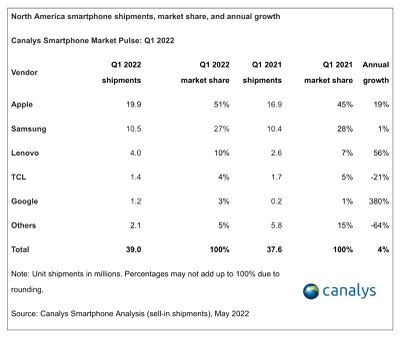Apple shipped an estimated 20 million iPhones in North America in the first calendar quarter of 2022, marking notable growth, according to shipment estimates that were shared today by Canalys.

iPhone shipments were up nearly 20 percent from the 17 million iPhones shipped in the year-ago quarter, and Apple's market share hit 51 percent, up from 45 percent.
Apple was the number one smartphone vendor in North America, with Samsung coming in second with 10.5 million smartphones shipped. Lenovo was a distant third with 4 million smartphones shipped, and TCL, Google and others sent out even fewer. Apple, Google, and Lenovo saw market share growth during the quarter, while TCL, Samsung, and other smaller vendors did not.

Canalys attributes Apple's notable growth to the popularity of the iPhone 13 lineup, which came out last September. The iPhone 13 models introduced camera improvements, faster A15 chips, battery life improvements, smaller notches, new colors, and more. The $429 5G iPhone SE also helped Apple boost sales during the quarter.
"The North American smartphone market has been buoyed by Apple's strong growth," said Canalys Analyst Brian Lynch. "This quarter, the iPhone 13's high popularity was the key driver. With global demand more uncertain, Apple has shifted more devices back into North America after prioritizing other regions in Q4 2021, allowing it to greater fulfill demand and deliver on backorders from the previous quarter. In addition, the launch of the latest edition of the iPhone SE offers an affordable option for many of North America's fiercely loyal iOS users. Despite not being mmWave-enabled, carriers' increasing investments in C-band and sub-6GHz spectrums will open the door for the iPhone SE's market growth in the coming quarters."
The North American smartphone market reached 39 million units shipped in total, up 3.7 percent compared to last year. Going forward, Canalys believes supply chain issues are going to be a continued problem for smartphone vendors, but the North American market is expected to take priority and "maintain healthy supply levels."























